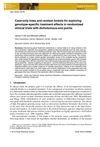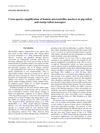 15 citations,
December 2013
15 citations,
December 2013 Men with more vanadium in their blood and who drink less soy milk are more likely to have hair loss.
 15 citations,
January 2010 in “Reproduction, Fertility and Development”
15 citations,
January 2010 in “Reproduction, Fertility and Development” A certain gene variant may increase the risk of polycystic ovary syndrome in Chinese women.
 14 citations,
February 2017 in “Scientific Reports”
14 citations,
February 2017 in “Scientific Reports” Certain variations of the HDAC9 gene can increase or decrease stroke risk in the Chinese population.
[object Object]  13 citations,
August 2017 in “Scientific reports”
13 citations,
August 2017 in “Scientific reports” Researchers developed a cost-effective 66 K SNP chip for cashmere goats that is accurate and useful for genetic studies.
 12 citations,
January 2016 in “Journal of Assisted Reproduction and Genetics”
12 citations,
January 2016 in “Journal of Assisted Reproduction and Genetics” Certain gene variations are linked to higher male hormone levels in Chinese women with PCOS and insulin resistance.
 11 citations,
April 2019 in “International Journal of Molecular Sciences”
11 citations,
April 2019 in “International Journal of Molecular Sciences” Certain genetic variations in OCT1 may improve insulin sensitivity with metformin in women with PCOS.
11 citations,
June 2015 in “Scientific Reports” The mtDNA N haplogroup is linked to a higher risk of late-onset lupus and specific symptoms in Han Chinese women.
 11 citations,
March 2013 in “Gene”
11 citations,
March 2013 in “Gene” A certain genetic variation in the IL1A gene may lower the risk of a hair loss condition in Chinese people.
 10 citations,
October 2014 in “Journal of Ovarian Research”
10 citations,
October 2014 in “Journal of Ovarian Research” The IRS-2 Asp/Asp genotype may increase the risk of PCOS in Chinese women, especially if they are not obese.
 9 citations,
March 2020 in “Gene”
9 citations,
March 2020 in “Gene” Certain gene variants in estrogen receptors are linked to polycystic ovary syndrome, mainly affecting metabolism, in Tunisian women.
 9 citations,
August 2013 in “PLOS ONE”
9 citations,
August 2013 in “PLOS ONE” Genetic variants at 20p11 increase baldness risk in Chinese Han people.
 9 citations,
November 2012 in “Archives of Dermatological Research”
9 citations,
November 2012 in “Archives of Dermatological Research” MC4R gene variants not linked to female hair loss.
 8 citations,
October 2019 in “Immunological investigations”
8 citations,
October 2019 in “Immunological investigations” The AIRE gene variant rs2075876 is linked to a higher risk of alopecia areata in males.
8 citations,
January 2015 in “Genetics and Molecular Research” Certain gene variations increase the risk of alopecia areata in Koreans.
 7 citations,
January 2015 in “Dermatology”
7 citations,
January 2015 in “Dermatology” Two gene variations, rs6493497 and rs7176005, may be linked to female hair loss in Chinese people.
 7 citations,
March 2011 in “Hormone and Metabolic Research”
7 citations,
March 2011 in “Hormone and Metabolic Research” Certain gene variations might help protect against insulin resistance and glucose intolerance in people with Polycystic Ovary Syndrome.
 6 citations,
February 2013 in “Medical Oncology”
6 citations,
February 2013 in “Medical Oncology” Certain genetic variants increase the risk of resistance to hormone therapy in prostate cancer patients.
 5 citations,
July 2019 in “Applied statistics/Journal of the Royal Statistical Society. Series C, Applied statistics”
5 citations,
July 2019 in “Applied statistics/Journal of the Royal Statistical Society. Series C, Applied statistics” Case-only trees and random forests improve predictions of treatment effects in clinical trials.
 5 citations,
May 2019 in “Archives of Dermatological Research”
5 citations,
May 2019 in “Archives of Dermatological Research” Narrowband UVB treatment increases certain gene expressions in psoriasis skin and improves symptoms.
[object Object]  4 citations,
November 2020 in “BMC Dermatology”
4 citations,
November 2020 in “BMC Dermatology” Researchers identified genes in scalp hair follicles that may affect hair traits and hair loss.
 4 citations,
January 2016 in “International journal of reproduction, contraception, obstetrics and gynecology”
4 citations,
January 2016 in “International journal of reproduction, contraception, obstetrics and gynecology” A certain genetic variation is linked to a higher risk of polycystic ovarian syndrome.
 4 citations,
December 2013 in “British Journal of Dermatology”
4 citations,
December 2013 in “British Journal of Dermatology” ESR2 gene linked to female-pattern hair loss.
 3 citations,
December 2018 in “Meta Gene”
3 citations,
December 2018 in “Meta Gene” Certain gene variations increase male hair loss risk, influenced by hormone levels.
 2 citations,
July 2019 in “PLOS ONE”
2 citations,
July 2019 in “PLOS ONE” Certain genetic variations are linked to higher liver enzyme levels in patients treated for chronic hepatitis C with specific drugs.
 2 citations,
January 2019 in “Annals of Dermatology”
2 citations,
January 2019 in “Annals of Dermatology” Certain gene variations in EGF and EGFR may increase the risk of alopecia areata in Koreans.
 1 citations,
March 2022 in “bioRxiv (Cold Spring Harbor Laboratory)”
1 citations,
March 2022 in “bioRxiv (Cold Spring Harbor Laboratory)” Low-coverage sequencing is a cost-effective way to identify genes related to wool traits in rabbits.
 1 citations,
June 2011 in “Journal of Genetics”
1 citations,
June 2011 in “Journal of Genetics” Some human genetic markers work for genetic studies in pig-tailed and stump-tailed macaques, which can help in their conservation.
 August 2024 in “OSMANGAZİ JOURNAL OF MEDICINE”
August 2024 in “OSMANGAZİ JOURNAL OF MEDICINE” The visfatin GT genotype may increase the risk of Alopecia Areata.
 December 2023 in “Research Square (Research Square)”
December 2023 in “Research Square (Research Square)” These specific gene polymorphisms are not linked to Alopecia Areata in Egyptians.
 January 2023 in “International Journal of Zoological Investigations”
January 2023 in “International Journal of Zoological Investigations” Certain genetic variations in IL-16 may increase the risk of alopecia areata.




























